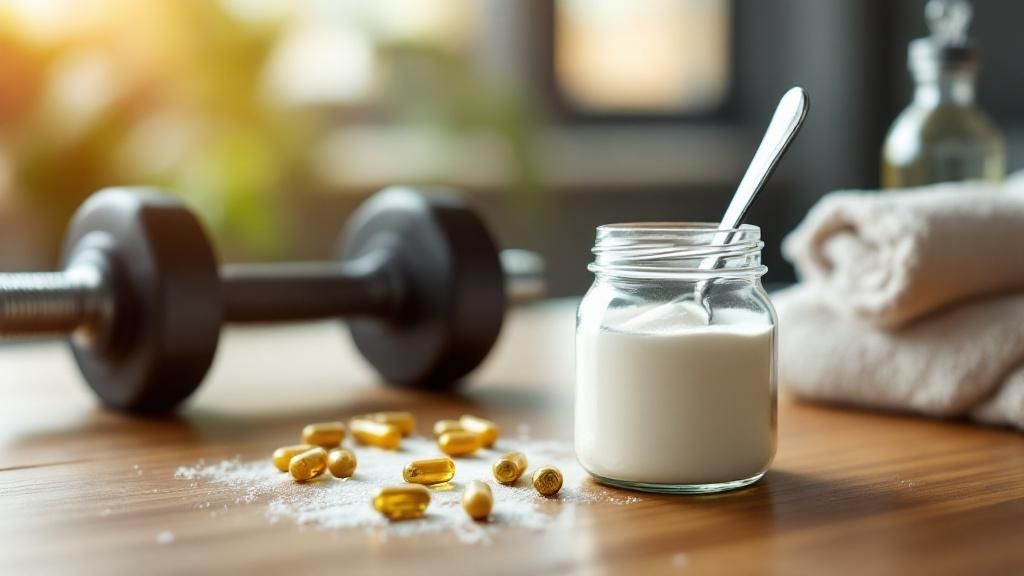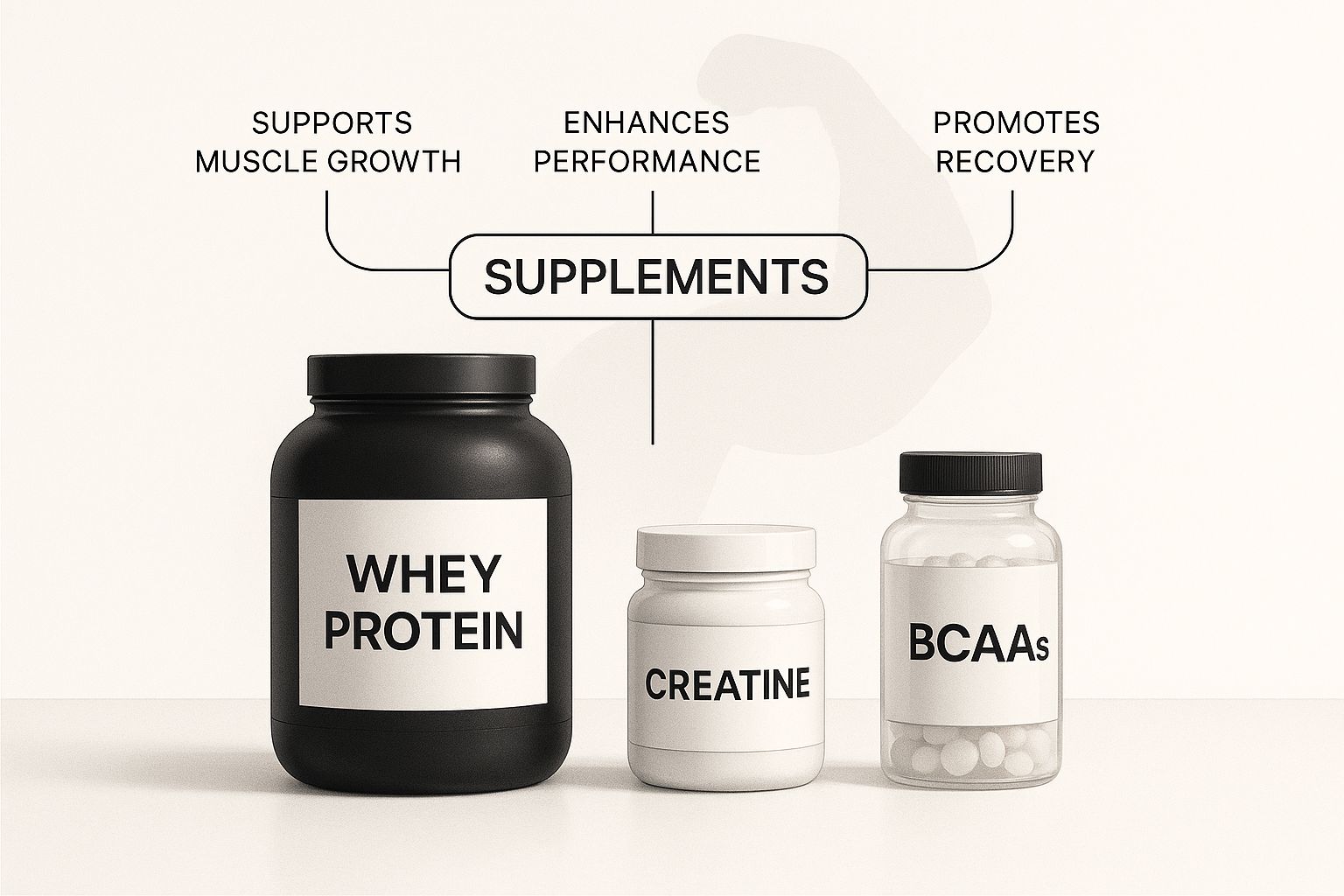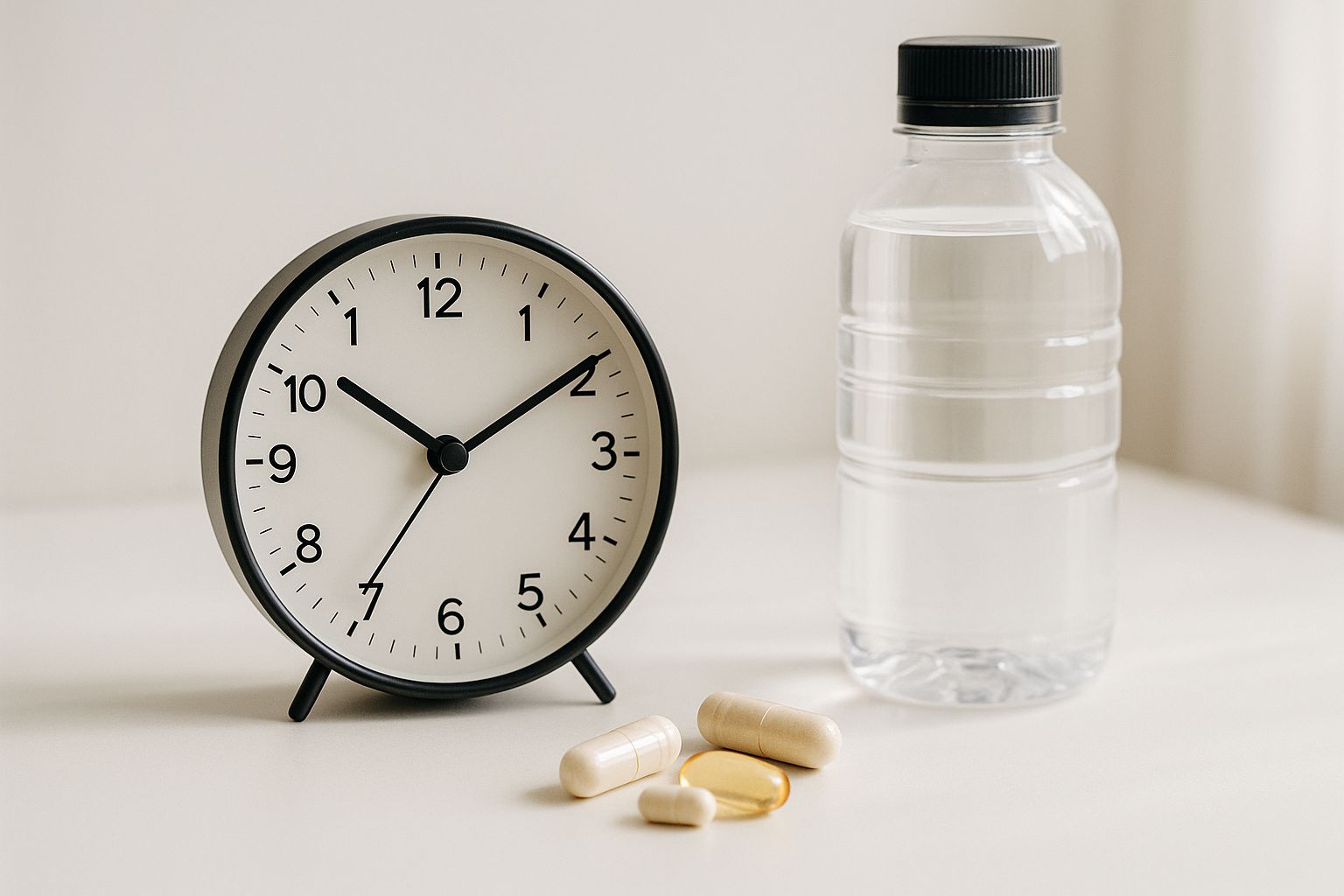
The Best Supplements for Muscle Recovery: A Practical Guide
Share
When you’re looking to speed up muscle recovery, the big hitters are pretty clear: creatine monohydrate is fantastic for getting your energy and strength back, whey or plant-based protein is essential for muscle repair, and anti-inflammatory helpers like omega-3 fatty acids and magnesium are brilliant for easing soreness. These supplements give your body the exact tools it needs to heal up faster after you’ve pushed it hard.
Why Workout Recovery Is Your Secret Weapon
We tend to think that all the gains are made in the gym, but the real magic actually happens when you’re resting. Proper recovery is what transforms all that hard work into real results—more strength, better endurance, and visible muscle growth. Skipping it is like trying to build a house without letting the cement in the foundation dry; it’s just not going to hold up.
Think of your workouts as creating tiny, controlled cracks in a wall. This damage is necessary to signal your body to rebuild. Recovery is the process where your body not only patches up those cracks but reinforces the whole structure, making it stronger than it was before. That soreness you feel after a tough session? That’s the feeling of your muscle fibres healing and growing.
The Science of Muscle Repair
When you train, you create microscopic tears in your muscles. This kicks off a complex repair process in your body, which often brings along its old friend, Delayed Onset Muscle Soreness (DOMS)—that familiar ache that usually hits its peak 24 to 48 hours after a workout.
Good nutrition provides the raw materials needed for this big repair job. While a solid, balanced diet is always the foundation, the right supplements can seriously speed things up. They work by:
- Refuelling the Tank: Restoring the energy (glycogen) your muscles burned through.
- Calming Inflammation: Soothing the exercise-induced inflammation that makes you feel so sore.
- Providing Building Blocks: Supplying the amino acids needed to patch up and build new muscle tissue.
- Improving Sleep: Helping you get that deep, restorative sleep where most of the repair work happens.
Think of supplements as a specialist construction crew for your muscles. Your body can do the job on its own, but the right supplements bring in top-quality materials and skilled labour to get the project finished faster and more efficiently. This means less downtime between your training sessions.
This is exactly why finding the best supplements for muscle recovery has become so important for everyone, from elite athletes to weekend warriors. In fact, the UK sports nutrition market was valued at around USD 1.49 billion and is expected to hit USD 3.23 billion by 2035, all driven by a growing understanding of how critical recovery really is.
Before we dive into the specific supplements, let's take a quick look at the most effective options out there. This table will give you a snapshot of what works best and who it's for.
Top Supplements for Muscle Recovery at a Glance
| Supplement | Primary Recovery Benefit | Best For |
|---|---|---|
| Creatine | Restores energy for strength & power | Athletes focused on high-intensity training |
| Protein Powder | Provides amino acids for muscle repair | Anyone looking to build muscle and reduce soreness |
| Omega-3s | Reduces inflammation and DOMS | Individuals wanting to manage post-workout aches |
| Magnesium | Relaxes muscles and aids sleep | People who experience cramps or poor sleep |
This table is just a starting point. Now, we’ll get into the details of how each one works and how you can use them to your advantage.
While supplements are a huge help, they're just one part of the puzzle. Effective recovery involves a whole range of strategies; you can explore additional muscle recovery tips to build a complete post-workout routine. Understanding the bigger picture helps you create a smarter, more effective approach to your fitness.
This guide will be your roadmap, breaking down the supplements that genuinely make a difference so you can recover faster, feel less sore, and get back to training with renewed power.
Understanding How Your Muscles Actually Heal
Ever wondered what’s really going on inside your body after a tough workout? It's more than just feeling sore. It’s a fascinating biological process where your body gets down to business, repairing and reinforcing itself to come back stronger. Nailing this process is the secret to getting the most out of your recovery supplements.
When you lift weights or push through an intense session, you're actually creating tiny, microscopic tears in your muscle fibres. Don't worry, this is a good thing—it's the necessary trigger for growth. This damage essentially sounds an alarm, calling your body’s internal "emergency crew" to rush to the site and start the repair work.
This repair process is a constant balancing act between two key players:
- Muscle Protein Synthesis (MPS): This is the rebuilding phase. Your body grabs amino acids—the building blocks of protein—to patch up the damaged muscle fibres and even add new ones, making the muscle bigger and more resilient.
- Muscle Protein Breakdown (MPB): This is the natural clean-up process, where old or damaged proteins are cleared away. While some breakdown is perfectly normal, too much MPB can sabotage your progress and slow recovery to a crawl.
For your muscles to actually grow, the rate of synthesis must be greater than the rate of breakdown. The right nutrition and supplements are what provide the essential materials to tip the scales heavily in favour of rebuilding.
The Construction Crew Analogy
Picture your muscles as a brick wall. Your workout is like a controlled demolition team, creating small cracks and weakening the structure. As soon as you're done, your body sends in a construction crew to fix the damage.
But this crew needs two things to work effectively: raw materials (like bricks and mortar) and energy.
Think of Muscle Protein Synthesis as the crew actively laying new, stronger bricks. Muscle Protein Breakdown is the team clearing away the old, crumbled ones. Your job is to keep the builders well-supplied so they can work faster than the demolition crew.
Supplements like protein powders provide the high-quality "bricks" (amino acids) needed for the job. Others, like creatine, make sure the construction crew has enough energy to work efficiently through their entire shift. This is exactly why a smart approach to supplementation can be so effective.
The infographic below highlights some of the key players in this rebuilding process.

As you can see, core supplements like whey protein, creatine, and BCAAs directly supply the resources your body is crying out for to kickstart and speed up repairs.
Why This Process Matters for Your Results
Without the right resources on hand, your body’s repair crew just can't keep up. The result? Prolonged soreness, fatigue, and stalled progress. You might feel like you're constantly spinning your wheels, training hard but not seeing the changes you're working for.
Giving your body the right nutrients at the right time is what makes this healing cycle work like a well-oiled machine. This is especially true here in the UK, where sports nutrition is a massive part of training culture. In fact, athletes account for roughly 63% of the market's total usage, relying on supplements like whey protein and creatine to boost muscle protein synthesis and speed up recovery within that critical 24-48 hour window after exercise. You can discover more insights about the UK sports nutrition market and its growth.
By understanding the mechanics of how your muscles heal, you can move beyond just randomly buying products and start making truly informed choices. You’re no longer just taking a supplement; you’re strategically supporting a fundamental biological process. This knowledge gives you the power to build a smarter, more effective recovery plan that’s built around what your body actually needs.
Core Supplements for Rebuilding Stronger Muscle

Now that we've got a clear picture of how muscles heal, we can dive into the supplements that give your body the raw materials for that repair job. These are the heavy hitters—the tried-and-tested options that get straight to work fuelling muscle protein synthesis and restoring energy. Think of them as the non-negotiables in any serious recovery plan.
Two supplements, in particular, stand head and shoulders above the rest for rebuilding and refuelling: protein powder and creatine monohydrate. They tackle the two most critical jobs after a workout: handing over the building blocks for repair and topping up the energy needed to perform at your peak. Let’s get into exactly how they do it.
Protein Powder: The Essential Building Blocks
When it comes to muscle repair, protein is the undisputed king. It’s the source of the amino acids your body needs to patch up those tiny micro-tears from exercise and build back stronger. Without enough protein, your body’s construction crew simply doesn't have the materials to work with, grinding your progress to a halt and leaving you sore for longer.
Imagine trying to fix a crumbling wall without any bricks. You can have the most skilled builders in the world on-site, but without the basic materials, nothing gets done. A quality protein powder is like a direct delivery of premium bricks right where your muscles need them.
There are a few excellent types to choose from, each with slightly different perks:
- Whey Protein: This is a fast-digesting protein from milk, absolutely loaded with essential amino acids—especially leucine, a powerful trigger for kick-starting muscle protein synthesis. It's the perfect choice for a post-workout shake when you want to get the recovery process going ASAP.
- Casein Protein: Also from milk, casein is the slow-and-steady option. It forms a gel in the stomach, releasing amino acids gradually over several hours. This makes it a fantastic choice before bed to drip-feed your muscles overnight.
- Plant-Based Proteins: Options like pea, rice, hemp, or soy protein are brilliant if you're vegan or have issues with dairy. Modern blends are expertly formulated to provide a complete amino acid profile, easily rivalling their dairy-based counterparts.
For most people, a serving that delivers 20-30 grams of protein after a workout is the sweet spot for maximising muscle protein synthesis and recovery.
Creatine Monohydrate: The Energy Recharger
While protein handles the structural repairs, creatine is all about refuelling your energy system. It's one of the most researched sports supplements on the planet, with a mountain of evidence backing its ability to improve strength, power, and muscle growth.
Creatine works its magic by increasing your body's stores of phosphocreatine, a molecule that helps rapidly produce adenosine triphosphate (ATP). ATP is your body’s main energy currency, the stuff that powers short, explosive movements like lifting weights or sprinting. More phosphocreatine means your body can regenerate ATP much faster during a tough workout.
Think of your muscles’ ATP stores as a small, rechargeable battery that powers intense contractions. A tough set drains it fast. Creatine acts like a high-speed charging pack, helping that battery power back up much quicker so you’re ready for the next set with greater strength.
This boost in energy production doesn't just help you during your workout; it also supports the recovery process afterwards. Studies have shown that supplementing with creatine can lead to greater muscle strength during the recovery period following intense training. For a pure, effective option, you can learn more about creatine monohydrate and how it fits into a recovery stack.
A standard, effective dose is 3-5 grams of creatine monohydrate per day. You can take it whenever you like—consistency is far more important than timing.
Debunking the Anabolic Window
For years, the fitness world was obsessed with the "anabolic window"—a mythical 30-60 minute period after training where you had to slam a protein shake or risk losing all your gains. While having protein after a workout is definitely a good idea, modern science has shown this window is much larger than we first thought.
The real key is your total daily protein intake. As long as you’re hitting your protein target, spread reasonably throughout the day, your muscles will have what they need to recover and grow. A post-workout shake is a super convenient way to get a dose in, but there's no need to panic if you can't have it the second you finish your last rep. The same goes for creatine; taking it consistently every day is what truly matters for saturating your muscles.
By nailing these two core supplements, you’re giving your body both the building materials and the energy it needs to rebuild stronger, recover faster, and come back ready to crush your next session.
Supplements That Reduce Soreness and Fight Inflammation

While protein and creatine are busy rebuilding your muscle fibres, a different kind of support crew is needed to manage the aftermath of a tough workout. Let's be honest, rebuilding is only half the battle. Tackling the soreness, stiffness, and inflammation that comes with it is crucial if you want to stay consistent with your training.
This is where supplements designed to calm the system and soothe aches come into play. They help you bounce back faster, so you can hit your next session without feeling like you've been run over.
Think of these supplements as the firefighters of your recovery plan. Your workout creates a controlled "fire" (inflammation), which is a necessary signal for repair. These nutrients then come in to dampen the flames, allowing the rebuilding process to happen smoothly and with a lot less pain.
Omega-3 Fatty Acids: The Inflammation Managers
One of the best tools in your arsenal for managing exercise-induced inflammation is Omega-3 fatty acids. We're talking specifically about EPA (eicosapentaenoic acid) and DHA (docosahexaenoic acid). These essential fats, famously found in oily fish, are absolute game-changers for regulating your body's inflammatory response.
A bit of inflammation is good—it kick-starts muscle repair. But when it goes on for too long, it just prolongs soreness and gets in the way of recovery.
Omega-3s help bring everything back into balance, making sure the inflammatory response does its job without going overboard. The result? A noticeable drop in that dreaded Delayed Onset Muscle Soreness (DOMS) and less stiffness in the days after a killer workout.
For a potent, marine-based source, many people are now exploring options like Green Lipped Mussels, which are naturally packed with anti-inflammatory compounds. You can learn more about the benefits of green lipped mussel in our detailed guide.
Magnesium: The Muscle Relaxer
Ever been woken up by a brutal muscle cramp or struggled to unwind after a late-night gym session? You might be short on a key recovery mineral: magnesium. This powerhouse is involved in over 300 biochemical reactions in the body, and many of them are critical for muscle function and relaxation.
Magnesium helps regulate the signals between your nerves and muscles. When your levels are low, muscles can get tight and become prone to cramping. Supplementing with magnesium can help your muscles physically let go of the tension they've been holding since your workout.
On top of that, it plays a massive role in promoting quality sleep—the ultimate recovery state where your body releases growth hormone and gets to work on deep tissue repair.
This growing focus on soothing and repairing is a huge reason the UK’s supplement market is booming. In fact, it was valued at USD 8.81 billion and is projected to climb to USD 20.4 billion by 2035. This demand is heavily driven by supplements like omega-3s and magnesium.
Other Powerful Anti-Inflammatory Allies
Beyond the big two, a few other natural compounds have shown real promise for kicking soreness to the kerb.
- Tart Cherry: This fruit is loaded with anthocyanins, powerful antioxidants shown to significantly cut down on muscle pain and strength loss after tough exercise.
- Turmeric (Curcumin): Curcumin, the active compound in turmeric, is a potent anti-inflammatory. It works by blocking some of the key pathways that trigger inflammation, helping to ease both joint pain and muscle soreness.
By bringing these kinds of supplements into your routine, you're not just masking the pain. You're actively helping your body control inflammation and manage soreness at a cellular level. It's about being proactive so you can feel better, faster.
It's clear these supplements tackle a different part of the recovery puzzle than the "rebuilders" we talked about earlier. To make it crystal clear, here’s how they stack up.
Comparing Supplements for Soreness vs Rebuilding
The world of recovery supplements can be split into two main camps: those that rebuild tissue and those that reduce soreness. Think of it as having a construction crew (rebuilders) and a clean-up crew (soreness reducers) working together.
| Supplement | Primary Function | Mechanism of Action |
|---|---|---|
| Protein Powder | Rebuilding | Provides amino acids for muscle protein synthesis. |
| Creatine | Rebuilding | Restores ATP for energy and strength recovery. |
| Omega-3s | Soreness Reduction | Helps regulate the body's inflammatory response. |
| Magnesium | Soreness Reduction | Aids in muscle relaxation and improves sleep quality. |
By addressing both sides of the coin—rebuilding and soreness—you create a complete, well-rounded recovery strategy. This is how you come back from every session stronger, faster, and with far less discomfort.
Optimising Recovery Through Better Sleep and Less Stress
True muscle recovery isn't a switch you flick on and off in the hours after a workout. It’s a 24/7 process, and it’s deeply tied to your mental state. If you’re smashing it in the gym but completely ignoring sleep and stress, you're essentially trying to fill a bucket with a massive hole in it. Your efforts will only get you so far.
This is where we need to look beyond the muscles themselves and focus on the two biggest drivers of whole-body repair: quality sleep and effective stress management. These two factors really govern the hormonal environment your body needs to heal properly. When they're out of whack, your progress can grind to a halt, no matter how perfect your nutrition is.
Taming the Stress Hormone Cortisol
Intense exercise is a form of physical stress. In the short term, this is brilliant—it’s the very signal that tells your body to adapt and get stronger. The problem starts when chronic stress from work, life, and even overtraining keeps your levels of cortisol, the primary stress hormone, permanently jacked up.
When cortisol is constantly high, it becomes a major roadblock to muscle growth. It can actually encourage muscle protein breakdown and seriously interfere with the anabolic (rebuilding) processes you’re working so hard to kickstart.
This is where adaptogens come into play. These are natural substances that, as the name suggests, help your body adapt to stress and find a state of balance, or homeostasis.
Think of adaptogens as a thermostat for your stress response. Instead of letting your system run too hot (high cortisol) or too cold (total fatigue), they help it maintain a comfortable, efficient temperature. This allows your body to dedicate its resources to recovering more effectively.
One of the most well-researched adaptogens for getting a handle on cortisol is Ashwagandha. Studies have shown it can help moderate the body's stress response, which can lead to lower cortisol levels, reduced feelings of stress, and better overall recovery.
The Critical Role of Quality Sleep
While you're asleep, your body enters its prime-time recovery window. This is when it gets to work on the most important repair jobs, like releasing human growth hormone (HGH), which is absolutely vital for tissue repair and muscle growth.
Skimping on sleep, or just getting poor-quality rest, robs your body of this critical opportunity. You’ll probably feel fatigued and sore for longer, and your performance in the gym will inevitably take a hit. Making sleep a non-negotiable part of your training plan is one of the most powerful things you can do for your recovery.
Certain supplements can give you a real helping hand in falling asleep and staying asleep, turning your rest time into a powerful recovery tool.
- Magnesium: This essential mineral is a bit of a hero for relaxation. It helps calm the nervous system and relax your muscles. Since many of us don't get enough, a supplement can be a game-changer for reducing nighttime muscle cramps and promoting deeper, more restorative sleep. For more detailed advice, check out our guide on the best time to take magnesium to maximise its benefits.
- L-Theanine: An amino acid commonly found in green tea, L-Theanine is brilliant for promoting relaxation without making you feel drowsy. It can help quiet a racing mind, making it that much easier to drift off to sleep peacefully.
By combining a solid sleep routine with stress-managing supplements, you create an internal environment that is perfectly primed for recovery. You're not just helping your muscles heal; you're supporting the entire system responsible for making you stronger, healthier, and more resilient.
This approach shows that the best supplements for muscle recovery don't always work on the muscles directly. Sometimes, they work by shoring up the very foundations of health—sleep and stress—that make all your other recovery efforts possible in the first place.
Building Your Personal Muscle Recovery Stack
Alright, let's put all this theory into practice. Building a personalised supplement stack isn't about just grabbing everything that looks good on the shelf. It’s about making smart, targeted choices that line up with your body, your goals, and how you train. This simple framework will help you build a routine that actually works for you.
First things first: take an honest look at your needs. How hard you train, what you eat, and your general lifestyle all have a massive say in which supplements will give you the most bang for your buck.
A "stack" is simply a combination of supplements taken together to achieve a specific goal. Think of it like assembling a specialised toolkit—you choose the right tools for the job at hand, whether that's building strength, boosting endurance, or just feeling less sore.
Before you even think about buying anything, remember the golden rule: food first. Supplements are there to plug nutritional gaps and fine-tune your recovery, not to replace a solid diet packed with protein, carbs, and healthy fats.
Tailoring Your Stack to Your Goals
The right mix of supplements for you will look completely different from the next person's, and it all comes down to what you're trying to achieve. Let's break down a few common scenarios to see how this plays out in the real world.
-
For the Dedicated Weightlifter: Your world revolves around strength and building muscle. Your non-negotiables are Creatine Monohydrate (3-5g daily) for that extra power and a solid Protein Powder (20-30g post-workout) for muscle repair. You might also add Magnesium before bed to help your muscles relax and improve your sleep.
-
For the Endurance Athlete: You’re all about sustained energy and keeping inflammation in check. Key players here include Omega-3s to help manage soreness and a daily Multivitamin to cover all your micronutrient bases. An Energy Powder with electrolytes can also be a game-changer for hydration and performance.
-
For the Everyday Fitness Enthusiast: Consistency and overall wellness are your goals. A high-quality Protein Powder is a fantastic starting point. Tossing in some Ashwagandha can help manage daily stress, while Magnesium can work wonders for your sleep quality, supporting your recovery from all angles.
How to Choose High-Quality Supplements
Once you've got an idea of your stack, the final piece of the puzzle is picking quality products. Trust me, not all supplements are created equal, so it really pays to be a savvy shopper.
Always have a good look at the label. You're looking for clear ingredient lists without any "proprietary blends" that hide the exact dosages. Most importantly, try to find products that have been third-party tested. This just means an independent lab has checked that the product actually contains what it says it does and is free from any nasty contaminants.
When you start any new supplement, always follow the "start low and go slow" rule. Begin with the smallest recommended dose to see how your body gets on with it before even thinking about increasing it. This is the safest way to avoid side effects and helps you figure out what's genuinely making a difference.
Your Top Questions About Recovery Supplements
Dipping your toes into the world of muscle recovery supplements can feel a bit overwhelming, and it's natural to have questions. Let's tackle some of the most common ones with practical, straightforward answers to help you feel confident about the choices you're making.
How Quickly Will I See Results?
This is probably the number one question on everyone's mind. It’s crucial to set realistic expectations here: recovery supplements aren't magic pills. Think of them less as a quick fix and more as a long-term investment in your body's performance and repair.
Sure, you might feel the calming effects of magnesium fairly quickly, but the real muscle-building and performance benefits from creatine and protein build up over weeks and months. Consistency is far more important than any immediate effect. Stick with it, and you'll see meaningful changes.
Can't I Just Get Everything I Need from Food?
A "food-first" approach is always the best foundation. There's no substitute for a balanced diet packed with quality protein, complex carbs, and healthy fats – that's the bedrock of your body's ability to repair itself.
However, if you're hitting it hard in the gym or training regularly, your body's demands for certain nutrients skyrocket. Trying to hit those optimal levels for enhanced recovery through food alone can be a real challenge. This is where supplements play a strategic role, filling in the gaps with a convenient, concentrated dose of exactly what you need, like protein right after a workout or magnesium before bed.
Are There Any Side Effects I Should Worry About?
For the most part, widely used recovery supplements like protein powder, creatine, and magnesium are considered very safe for healthy people when taken as recommended.
Some people might notice a bit of mild digestive upset when they first introduce something new, but this usually settles down as their body gets used to it.
A good rule of thumb is to always start with a lower dose of any new supplement. This gives you a chance to see how your body reacts, minimises any potential issues, and helps you figure out what works best for you. For those with specific questions, like whether creatine is suitable for women, the definitive guide to women and creatine is a fantastic resource.
Should I Take My Supplements on Rest Days?
Absolutely. For certain supplements, taking them on your days off is key. The whole point of things like creatine and magnesium is to maintain consistent, topped-up levels in your body so they're always ready to go when you need them.
If you skip your non-training days, your levels can dip, making the supplement less effective overall. It's a bit like keeping the oil in your car topped up – you don't just add it right before a big trip. Consistent daily intake ensures your muscles are always primed for recovery and growth, even on the days you're not lifting.
This article is for informational purposes only and is not medical advice. Always consult a qualified health professional before starting any new supplement or major lifestyle change.
